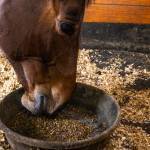Question
My horse slobbers uncontrollably when he is allowed access to clover pastures. What causes this, and is there anything I can do to prevent it? Should I worry?
Answer
As long as all other causes of have been ruled out (e.g., traumatic mouth injury, esophageal obstruction or choke, and viral infections such as vesicular stomatitis), profuse salivation is likely occurring because the horse is consuming legumes infected with the fungus Rhizoctonia leguminicola. This fungus grows on legumes of all kinds and not solely red clover, as some horsemen mistakenly believe. If harboring sufficient fungal loads, white clover, alsike clover, alfalfa, ladino, and lespedeza can induce slobbering. The fungus produces slaframine, and it is this mycotoxin that actually provokes the extreme salivation. In humid growing condition, the fungus proliferates quickly and is visible on plant leaves as gold, brown, or black spots or rings (thus the name “black patch disease”).
Excessive salivation will commence several days following initial consumption of fungus-ridden plants, and it is not unusual for horses to generate 12-15 gallons of saliva daily. Because of this hyperproduction of saliva, mild to severe dehydration can occur in horses, particularly during hot weather.
Slaframine content in stored forages such as hay decreases as time elapses. In one study of baled red clover conducted in the early 1980s, the amount of slaframine decreased from 100 ppm (parts per million) to 7 ppm over a ten-month period.
Although there is no treatment for slaframine overload other than removing infected plants from the diet, certain pasture management practices can minimize the occurrence of the condition: sow no more than 40% legumes in pastures; spot-check leaves of legume plants for telltale spots or rings during periods of high moisture; utilize a drylot for horses if affected pastures remain wet for an extended time and feed supplemental hay; and mow pasture grasses to maintain plant height at about three to four inches. If these recommendations cannot be worked into the pasture management scheme, horses should be offered free-choice salt and water during hot weather to counteract any dehydration that might occur with the ingestion of legumes contaminated with Rhizoctonia leguminicola.








